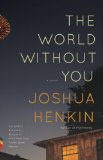Summary | Excerpt | Reading Guide | Discuss | Reviews | Readalikes | Genres & Themes | Author Bio

A Novel
by Joshua HenkinPrologue
Here,” she says, “I’ll get you a sweater.” She’s barely done speaking before she’s taking the stairs two at a time, her espadrilles clomping against the peeling wood, transporting her down the long hallway. It’s July and twilight comes late, so even now, at nine o’clock, the last of the sun still colors the sky, but inside the house the corridors are dark and she’s neglected to illuminate the antique standing lamp at the top of the stairs as if to reflect an inner austerity. It’s their country house, but like their apartment in the city the hallway runs through it, an endless spine, which she traverses now, past the Kathe Kollwitz etchings and the street map of Paris and the photographs of her and David’s grandparents staring down at them on opposite sides of the wall from another continent and century. She moves with such purpose (dogged, implacable: those are the words David uses to describe her) that when she reaches the lip of their bedroom and steps inside she’s startled to discover she’s forgotten what she came for.
She calls out to him, but he doesn’t respond.
“Are you there?”
There’s silence.
“David?” She’ll turn seventy next spring, and David will, too (They were born a week apart. They’ve figured it out: she was emerging from the womb at the very hour he was circumcised, the first and last Jewish ritual he ever partook of, which places him, she thinks, one Jewish ritual ahead of her.), and she’s taken to saying her memory has begun to fail her, though she knows that’s not true. Or no more true than for any sixty-nine-year-old—or for any adult human, for that matter. To have the memory of an infant, a toddler. She recalls Clarissa at ten months, those first stabs at language, how she resolved right then to teach her daughter French and German, to do it while it was still possible. She felt the same with Lily and Noelle, and again a few years later when Leo was born. She spent her junior year in Paris, at the Sorbonne, and David spent his junior year in Düsseldorf. Her French was rusty by the time the children were born, and David’s German was rusty, too, but it was worth a try, wasn’t it, she said, and she still had her Berlitz tapes. And David, who in those days was still inclined to indulge her, allowed her to convince him to embark on a summer experiment; she would speak French to Clarissa and he would speak German. Two junior years abroad between them, one set of Berlitz tapes: the experiment lasted a week, the two of them speaking to baby Clarissa in their bad French and bad German until it became obvious to Marilyn what should have been obvious to her all along, that their daughter wasn’t going to be trilingual; she was going to be mute, a wolf-child.
She remembers now. A sweater. She stands in front of their old closet, and there they are: David’s shirts pressed and starched and evenly spaced, the shoes lined up in pairs, the sweaters folded in piles, next to them hanging a single brown cardigan. For a second she feels like a voyeur, looking in on a life that’s no longer hers, and as she reaches out to grab the cardigan her hand shakes.
She heads back downstairs, and when she reaches the landing she calls out again, but he still doesn’t respond. For an instant she panics: has he run off?
“I was calling you,” she says. “Didn’t you hear me?”
“I guess not.” David is out on the porch, reading the Times, reclined on one of their old lawn chairs. His legs stick out in front of him; he taps his feet against the edge of the chair.
“I got you this.” She hands him the cardigan, which he takes obediently, but now he’s just laid it folded across his lap.
“You said you were cold.”
Excerpted from The World Without You by Joshua Henkin. Copyright © 2012 by Joshua Henkin. Excerpted by permission of Pantheon, a division of Random House, Inc. All rights reserved. No part of this excerpt may be reproduced or reprinted without permission in writing from the publisher.
Harvard is the storehouse of knowledge because the freshmen bring so much in and the graduates take so little out.
Click Here to find out who said this, as well as discovering other famous literary quotes!
Your guide toexceptional books
BookBrowse seeks out and recommends the best in contemporary fiction and nonfiction—books that not only engage and entertain but also deepen our understanding of ourselves and the world around us.